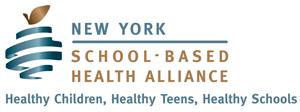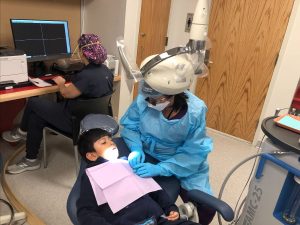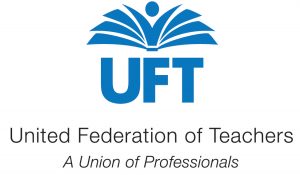A City & State Partner Article: New York Needs More Community Schools
By Michael Mulgrew
February 1, 2022
A student at P.S. 19, a UFT United Community School in Queens, receives a thorough dental exam at school
thanks to the pediatric dental program from community school partner the Family Health Centers at NYU Langone.
Schools should be real centers for each community, the place parents can turn to not just for academics, but for other services their families need. The UFT’s United Community Schools (UCS) — a nationally-recognized program — serves as this kind of lifeline for thousands of New Yorkers.
During the 2021-2022 school year alone, we coordinated more than 10,000 health clinic visits, fed more than 6,000 families, and provided more than 1,500 counseling and wellness check-ins with social workers, counselors, and professionals in our school-based health centers.
Our program — now nearly ten years old — has helped bring academic, social-emotional and health services, along with adult initiatives like English as a Second Language and even employment assistance for adults, to tens of thousands of families in underserved communities around the city.
The program works by funding a community schools director in each building who can work with local social service providers and other partners to bring their services directly into each school, giving families a one-stop location for a wide range of help they may need.
An independent study of the program found that nearly two-thirds of responding parents believed that their UCS students experienced significant changes in their interest in learning and in their problem-solving skills because of the programs, services, and support they received. Our own analysis shows that every $1 we invest brings in $6 in additional outside resources from our community partners.
In October 2019, the U.S. Department of Education described UCS as a “nationally significant” education program and awarded it one of eight national grants to provide additional mental health services, restorative practices, and after-school programming at three of its Bronx schools.
For the upcoming school year, we plan to connect more children to mental and behavioral health resources, intensify academic programming to help students deal with pandemic learning loss and to focus staff professional development around trauma recovery, social-emotional learning, and culturally responsive education.
United Community Schools deserves increasing state support for our program as it now exists. But we are asking for more — a $5 million special fund to help us scale the program up, making our expertise and technical support available to more schools, along with a $100 million allocation for a new categorical aid for schools around the state that want to take advantage of our model.
Strong schools and strong communities go hand in hand. We need to expand the benefits of our community school model not just to other New York City schools, but to schools and families across the state.
Mulgrew is the president of the United Federation of Teachers.
Sponsored by


